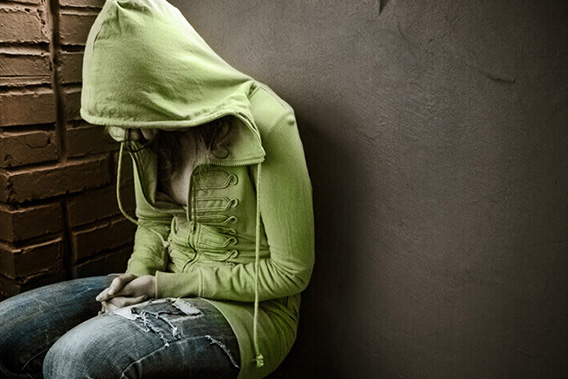Nathan was changing. He was becoming increasingly irritable, bored, sad, and just plain angry. When his mother would ask what was wrong, he’d snap, “I’m just having a bad day.”
For a few months Nathan’s mother assumed that the pressures of school and just being a young teen were the cause of her son’s moods swings. The school counselor told her that many teens experience stress and that being 16 is an awkward age. “Just give him time,” she said.So Nathan’s mother did, until one day when Nathan came home from school and said he wished he were dead.
Adolescence is not an easy time, so there is no simple way for parents to tell the difference between a bad case of the blues and symptoms of depression. So when feelings of sadness, loneliness, confusion, and anger persist, it may not be “just a phase” they will simply grow out of.It may in fact be depression.
Depression is on the rise among teens. Some studies report that depression affects about 5-8% of teens. Despite its increasing incidence and devastating effects, depression among teens remains woefully underdiagnosed and under-treated. Consequently, many depressed teens become seriously sick before a proper diagnosis is made. Because depression is linked to increased: risk-taking, substance abuse, promiscuity, pregnancy, delinquency, and suicide, early detection is critical.
The good news is that depression is highly treatable. Learning the facts and warning signs will help parent know when to get help.
Some types of depression:
Major Depression and Dysthymia are the most common types of depression observed in teens. Profound sadness, hopelessness, mental confusion, social isolation and thoughts of suicide characterize major depression. The course a depressive episode can vary, however if untreated an episode of major depression generally lasts one year.
Dysthymia is a “low-grade type of depression characterized by persistent feelings of sadness and worry. Children with dysthymia tend to have low self-esteem, poor social skills, and be pessimistic. They may have difficulty in school and trouble in forming relationships. Dysthymia can follow or precede a major depressive episode or be entirely unrelated.
What Causes Depression In Teens?
Recent studies have demonstrated that depression is rarely due to a single event or condition. Rather, it is the result of a complicated matrix of family, social, genetic and biochemical influences. As with many diseases, some people are more susceptible than others. However, depression tends to run in families. Or putting it another way, the vulnerability for depression is one of many family traits passed on from one generation to the next. For example, a child who has one parent with depression has a 10-to-13% GREATER chance of developing depression in his or her own lifetime. Clearly, the vulnerability for depression can be transmitted genetically. But genetic vulnerability is just that–a vulnerability–not destiny.
Symptoms of Depression
The symptoms of depression in children vary from child to child. While some teens look sad, others appear anxious and worried. In general depressed teens experience changes in their thinking, feelings and behavior. Here are some characteristics of each.
* Thinking negatively, self-defeating thoughts and problems with concentration and memory.
* Calling themselves “dumb,” or “ugly.”
* Hopelessness and irrational fears about the future increase as the disease progresses.
* Likeliness to obsess over minor faults and failures and see themselves as worthless.
* Appearing visibly sad, worried, and irritable.
* Complaining that they feel “bored while rejecting opportunities to participate in activities that they enjoy.
* Experiencing bouts of seemingly unprovoked anger.
* Using alcohol or drugs to medicate their depression.
* Clinging or becoming overly dependent on a girlfriend/boyfriend.
* Becoming preoccupied with death and dying, and making suicidal gestures.
* Experiencing difficulty sleeping and wake frequently during the night.
* Persistent nightmares in younger teens.
* Talking about hopelessness and death.
Getting help
If you suspect your teen is depressed get help immediately. Your pediatrician of family doctor is a good place to start. Treatment for depressed teens involves individual and family counseling and medication.
The use of antidepressant medications is becoming increasingly common as a treatment strategy. The number of children in the US prescribed medications to treat depression has tripled since 1986. Antidepressant medications are thought to work by increasing amount and availability of certain neurotransmitters (brain chemicals) in the brain, thus restoring chemical balance and appropriate mood.
The newer antidepressants, called selective serotonin reuptake inhibitors (SSRI’s) have proven to be effective for the treatment of depression and anxiety disorders in children and adolescents. Examples of these medications include Paxil®, Prozac®, Lexapro® and Zoloft®. Most of these medicines take several weeks before symptoms improve. In some, albeit rare instances, these medicines have increased depression and suicide attempts and therefore should only be used under the supervision of and experienced medical professional. Another somewhat unique antidepressant, Wellbutrin®, has a similar mechanism of action as the SSRI’s but works on different neurotransmitters. It has been successful in the treatment of depression and ADHD in children and teens and works much faster than the SSRI’s. It may be a good choice for those with attention problems and depression. The combination of medication and counseling has been shown to be a very effective modality for depressed teens.
Remember that depression is highly treatable illness and most teens can and do recover. Recent research shows that over 60 percent recover or partially recover after one year. Lastly, it is common for parents to second guess and blame themselves when a child is depressed. Keep in mind that depression is caused by numerous and largely unknown factors. Fretting about the cause will not change a thing and may even make matters worse. The best way to help your teen is to stay in the present, take time and listen to them, emphasize their worth, pray for them and with them, let them know how much you love them. Then let tomorrow take care of itself.
Stay Updated
Sign up for our monthly newsletter and weekly devotional










